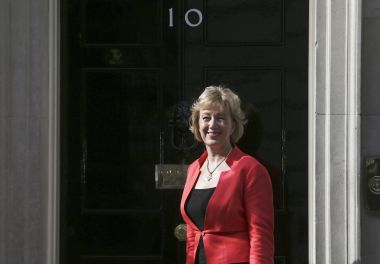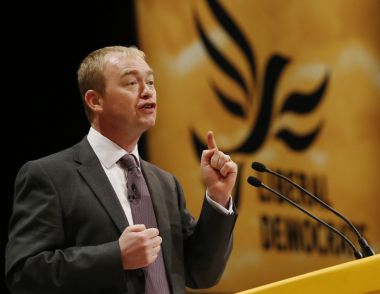Andrea Leadsom on gay marriage: Just the latest Christian politician to get it wrong

Potential prime minister Andrea Leadsom has become the latest Christian politician to be hauled over the coals for her views on gay marriage. Her views are under scrutiny because she voted against the prevailing liberal consensus on the issue.
Yet she didn't help herself with a series of answers which felt unclear and muddled. Speaking to ITV news, Leadsom said: "I believe the love of same-sex couples is as every bit as valuable that of opposite sex couples – absolutely committed to that. But nevertheless, my own view actually, is that marriage in the biblical sense is very clearly from the many, many Christians who wrote to me on this subject – in their opinion – can only be between a man and a woman."
Hang on, Andrea. Is it your view, or the view of people who wrote to you? She muddies the water further: "Civil partnerships are called marriage as well," she claimed, incorrectly. They're called civil partnerships.
"This is not about do I consider gay couples to be any less worthy of marriage than heterosexual couples – not at all, it's exactly the same. The issue is one I have around the consequences, the very clear hurt caused to many Christians who felt that marriage in the Church could only be between a man a woman. I think we've muddled the terms of marriage, civil partnership, church etc. I would have liked that to have been clarified. I didn't really like the legislation – that was the problem. But I absolutely support gay marriage."
There is so much going on here that it's hard to pick it apart. In one breath she says she supports gay marriage and that it's the same as heterosexual marriage. In the next breath she says she'd prefer marriage to remain between a man and a women because lots of Christian people believe that to be the case and she agrees with them. Except she doesn't.
Leadsom is merely the latest in a long line of Christian politicians to have come to grief over this. Nicky Morgan, the Education Secretary, said of the vote to introduce same sex marriage: "Well I stand by my vote in 2013. But yes, obviously, since then, having spoken to lots of different people, and realised quite how excluded people in same-sex relationships felt from the institution of marriage, and marriage is a pretty important institution for our society, I have realised that yes, were the vote to be re-run, I probably would vote in a different way." So she stands by her vote, but would vote a different way.
This kind of semantic shape-shifting isn't limited to Conservatives. Labour MP Barry Sheerman voted for same sex marriage, having previously been opposed to it. He said: "I saw the speakers and it was a bunch of extremely Conservative figures like Ann Widdecombe with whom I wouldn't identify... I thought, my God, I was right to change my mind." This is a curious argument. Sheerman didn't deal with the issue itself, but instead based his decision on the sort of person who was opposing the legislation.
Why are Christian politicians so bad at talking about this issue? Possibly because they realise that so much damage has been done to LGBT people over the centuries by Christians. Possibly because the debate on same sex marriage moved so quickly that many were having their preconceptions and opinions changed during and after the period where they made public statements. It may also be the case that they became tongue-tied because this is such an emotive issue on various sides.
Not all Christians believe the same thing about homosexuality. Some of those who are conservative in their personal beliefs may not want those beliefs enacted in law. Many believers feel conflicted between their interpretation of scripture and their experience of gay friends and relatives. The media ignores all this nuance however, and splits opinion into pro-equality good guys and anti-equality bigots.
Adherence to a particular stance on gay marriage is a shibboleth for the secular media. Questioning of Leadsom on this topic was predictable, given that she didn't vote in favour of gay marriage. She should have been prepared and she should have been clearer with her answer.
One politician who struck a better tone was the leader of the Liberal Democrats. Under intense questioning by Channel Four news upon his election to the leadership, Farron gave clear responses to how his faith, his politics and his position on gay marriage intersect. The viewer was free to disagree with him, but it was clear he wasn't inclined to fudge the issue.
When asked if homosexual sex is a sin, Farron said: "Somebody who is a Christian does not then go enforcing their views on other people... And it's not our views on personal morality that matter, what matters is, do we go out there and fight for the freedom of every single individual to be who they wish to be. That's what makes a liberal."
Agree with him or not, Farron is making a clear defence of his liberal politics alongside his evangelical faith. He went on: "We are all sinners. The Bible phrase I use most particularly with my kids is, 'You don't pick out the speck of sawdust in your brother's eye when there is a plank in your own.'

"Fundamentally, my faith is based upon the my belief that Jesus Christ is who He said He is... This [The Liberal Democrats] is the party of religious tolerance and indeed tolerance of people who are not religious at all... It's a peculiar thing to say that someone who happens to belong to a religious group can't be a liberal. It's exactly the opposite. To be a member of a minority group of any kind is to understand in a very clear way why every minority and ever individual's rights matter."
Again, you may agree or disagree with Farron's stance, but his clear definition of his liberal politics and his defence of a separation between his personal views and what he thinks should be enshrined in law shows a thoroughness of thought that is all too often lacking in pronouncements of sexuality from high profile Christians, and especially politicians.
Others should take a lesson from Farron and learn how to talk clearly and calmly about LGBT issues. It's the very least that this issue – and the people whose lives are affected by it – deserve.











